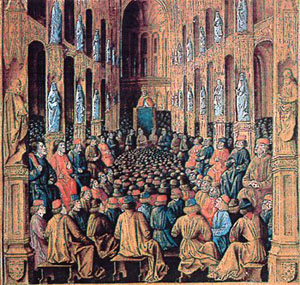 |
World History
Assault on Faith:
Fictitious ‘History’ as Weapon
Toby Westerman
Not long before the massive television coverage of the election of Pope Benedict XVI, viewers received a double-dose of historical fantasy disguised as fact.

Queen Noor of Jordan attacked the Crusades |
CNN's Larry King hosted Queen Noor of Jordan, who railed against the Crusades as an anti-Muslim movement, and, at about the same time, Fox News' Hannity and Colmes interviewed a representative of the American Civil Liberties Union, who used the terms "Dark Ages" and "Inquisition" in his argument against the use of a cross on Los Angeles' civic seal.
Emotionally charged or inaccurate references to the Crusades, the "Dark Ages," or the Inquisition are often used as bludgeons against Christianity.
The response to these fantasies is historical reality. The term Crusade is used to describe a series of armed conflicts, primarily in the Near East from 1095 to the mid-1200s. While the subject of the Crusades is complex and encompasses several geographic areas, the simple reality is that the Crusading movement did not initiate hostilities between Muslims and Christians.
Islamic armed struggle began shortly after the death of Muhammad in 632 A.D. Muslim-led armies launched large-scale attacks against the Christian Byzantine empire and against the Zoroastrian Persian empire.
By the mid-700s, Islamic forces had overrun all of the Persian Empire, the length of North Africa, most of Spain, and extended their reach into central France. Vast numbers of Muslim warships twice assaulted and nearly captured the Christian city of Constantinople, the capital of the Byzantine empire.
Islamic attacks against Christian territories continued, and often were successful. The Crusades in the Near East were less of an assault than a defensive move against centuries-old Islamic military aggression.

Pope Urban II calling the Crusades |
The First Crusade was prompted by a plea for help by the Byzantine Emperor Alexius I, and mistreatment of Christians in Muslim-controlled Jerusalem. It should be noted that Constantinople finally did fall to Muslim Turkish forces in 1453, and what was once the greatest of Christian cities is now the Islamic metropolis of Istanbul.
The last Islamic offensive against a Christian capital was the Turkish attack on Vienna in 1683.
The term "Dark Ages" is pejorative and misleading. It is used in popular discussion to refer to the period from the end of Roman rule in the West, about 500 A.D., to the beginning of the "Renaissance," about 1300. For much of this period, invasions by Germanic tribes and Islamic armies kept Europe in turmoil. In reality, the period of the "Dark Ages" was one of progress and development in the face of great odds. If one takes a look at a standard history text, one observes that the map of Western Europe from 500 to 1300 shows a dramatic expansion of population, the establishment of numerous large cities, and the beginning of nation-states.
This is the period of the founding of great universities, indeed the university system itself. The powerful trading cities of north Italy arose and developed sophisticated methods of finance and banking. Advances in agriculture enabled the population of Western Europe to rapidly expand. A thirst for knowledge and exploration eventually led to Columbus' discovery of the New World.
During this period, scholars advocated a return to Roman law and the end to tribal rituals for determining guilt or innocence, known collectively as the "ordeal." The Inquisition was part of this legal reform, and replaced instances of frenzied accusations or intentional false witness. The Inquisition was an attempt to bring order into the chaotic affairs of nations still emerging from tribalism, and can only be understood within this historical context.
Queen Noor merely resorted to historical inaccuracy to support an assertion. Far more dangerous, however, are those who employ anti-religious historical fallacies to denigrate faith, while demanding an entirely secular society. These individuals are, in reality, calling for a return to the godless, atheistic era of Lenin, Stalin, and Mao, a period far more cruel and murderous than the supposed "Dark Ages" or other similar fantasy.
Drive God out of society, and wholesale murder will enter.

Posted April 26, 2005
Toby Westerman writes and edits
International News Analysis - Today
An investigative, analytical, and uncompromising weekly analysis of the world situation
Contact T. Westerman at www.inatoday.com
or P.O. BOX 5182, Rockford, ILL, 61125-0182
Assault on Faith: Fictitious 'History' as Weapon
was published in the April 20, 2005 online edition of INA Today
|
History | Home | Books | CDs | Search | Contact Us | Donate

© 2002- Tradition in Action, Inc. All Rights Reserved
|
 |
|